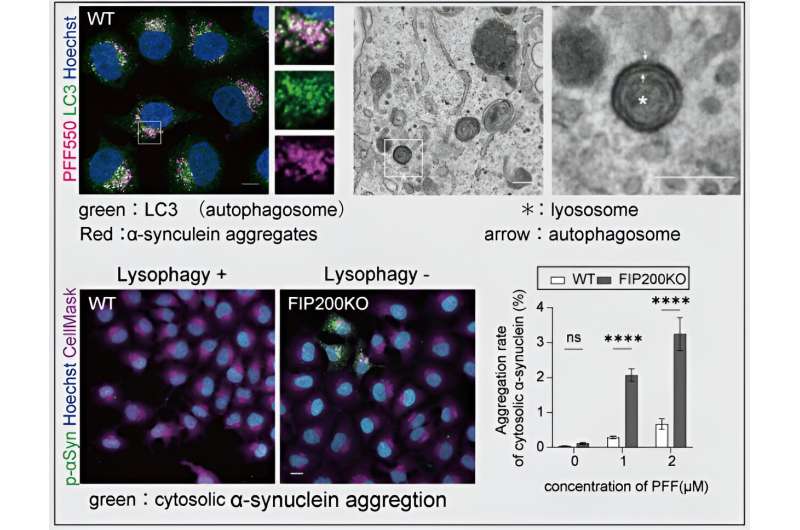This article has been reviewed according to Science X's editorial process and policies. Editors have highlighted the following attributes while ensuring the content's credibility:
fact-checked
peer-reviewed publication
trusted source
proofread
Researchers discover new links between cellular-waste removal and the development of Parkinson's

Although Parkinson's disease has been recognized for more than 100 years, no treatments can slow or halt the disease's progress, let alone cure it. One of the major factors underlying this lack of progress is our relatively poor understanding of how the disease develops.
In the study titled "Lysophagy protects against propagation of α-synuclein aggregation through ruptured lysosomal vesicles," published in Proceedings of the National Academy of Sciences, researchers from Osaka University have discovered an important process in Parkinson's disease development.
They noted that the ability of alpha-synuclein—a disease-related protein—to spread between cells is dependent on its escape from lysosomes, which are special compartments within cells that capture waste. More importantly, they found that this spreading can be prevented by the removal of damaged lysosomes from cells via a process known as lysophagy.
Alpha-synuclein was first linked to Parkinson's disease in 1997, when a genetic mutation was discovered in some patients. Subsequent investigations showed that alpha-synuclein is abundant in Lewy bodies, a major pathological marker of the disease. More importantly, this disease-related alpha-synuclein is not present in its native form, but is misfolded into different shapes.
Although we still don't know exactly how misfolded alpha-synuclein might cause Parkinson's disease, accumulating evidence suggests that misfolded alpha-synuclein may be the starting point for Parkinson's disease-related degeneration in the brain. In addition, misfolded alpha-synuclein can spread between cells and act as a so-called "seed," causing normal alpha-synuclein to become misfolded.
"Although misfolded alpha-synuclein is taken up by lysosomes for removal from cells, recent studies suggest that it can weaken the lysosomal walls and escape," says Keita Kakuda, lead author of the study. "Using cellular models, we decided to investigate whether this process is important for the cell-to-cell spreading of misfolded alpha-synuclein."
The researchers indeed discovered that misfolded alpha-synuclein was taken up by lysosomes, released after lysosomal rupture, and then taken up by other cells, where it caused native alpha-synuclein to become misfolded. Furthermore, by impairing the process of lysophagy, the research team showed that lysophagy contributed to prevention of the propagation of misfolded alpha-synuclein.
"Our findings suggest that the progress of Parkinson's disease neuropathology is closely linked to two things: lysosomal damage leading to rupture and impaired ability to remove these ruptured lysosomes," explains senior author of the study Hideki Mochizuki. "Notably, these results indicate therapeutic avenues that might delay or stop the disease from developing, which would represent a major breakthrough in treatments."
Given that alpha-synuclein pathology is also observed in a range of related diseases, such as multiple systems atrophy and some forms of Alzheimer's disease, the results from this study are far-reaching. Improvements in our understanding of how misfolded alpha-synuclein spreads could lead to better treatments for Parkinson's disease and related disorders.
More information: Keita Kakuda et al, Lysophagy protects against propagation of α-synuclein aggregation through ruptured lysosomal vesicles, Proceedings of the National Academy of Sciences (2023). DOI: 10.1073/pnas.2312306120




















